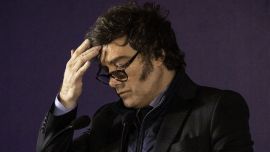It’s an early Spring evening in October and there’s a buzzing atmosphere of excitement and impatience in downtown Buenos Aires.
The city’s streets are humming with 200,000 expectant visitors waiting for the Opening Ceremony of the Buenos Aires 2018 Youth Olympic Games to begin.
Sixty-eight metres above the ground, at the very tip of the Obelisk, there’s an altogether different atmosphere, one of concentration and professionalism.
The members of Fuerza Bruta, Argentina’s genius performance group, are preparing to embark upon their most mind-bending – and challenging – performance to date.
The sight of a young flag-bearing and apparently gravity-defying athlete, vertically traversing down the iconic porteño emblem is not an image those gathered there on that October night will forget in hurry.
Least of all, Fabio D’Aquila, the general coordinator of Fuerza Bruta. Amidst the seeming impossibility and illusion of that special Olympian evening, he’s one of a few key players who helped make it all happen.
The rise of the top
Fuerza Bruta is the creative brainchild of Diqui James, Gaby Kerpel, Alejandro García and D’Aquila himself, yet the foursome’s bond was forged under a different name.
They initially met and started out back in 1985 pursuing experimental and alternative theatre with the group La Organización Negra. James, alongside Pichón Baldinú, then went on to create touring performance group La Guarda. Wanting to pursue their own creative interests and start a new project, in 2003 the foursome made the decision to go it alone, creating their own ensemble.
Since that turning point, the last 15 years have been a whirlwind for the group. Rising to meteoric success under the name Fuerza Bruta, the group has become a phenomenon not just in Argentina but globally. Very much in demand, the troupe has now performed shows in cities across the world, including London, New York, Madrid and Tokyo to name but a few.
D’Aquila, however, hints that this latest show, on home turf, was something special. And, as a result, he says, the troupe wanted to do something quintessentially porteño.
“When we think of previous Olympic Games, they become so associated with their host city, much more so than any other worldwide competitions or tournaments, which is why we wanted to take Buenos Aires’ most recognisable landmark and incorporate it into our performance,” he says proudly.
Taking on a challenge as monumental as the Obelisk, of course, requires preparation, but just how much? A lot, it seems.
Using the group’s knack for making the impossible possible, the 51-year-old explains that “the idea was approved only in May of this year.” Only then did the group truly begin preparing, he says, at their practice space.
“The performers began to build up slowly to the big feat by testing their ideas with staircases – a small-scale representation of what was to come,” he continues.”
Only as recently as August did Fuerza Bruta head to a nearby stadium to work with a scaleddown version of the Obelisk to practise technique and the use of harnesses.
Taking on challenges
Considering how their shows have sought to make the impossible achievable, iit seems only right that D’Aquila and his troupe incorporated some of the formidable challenges Argentina has faced into their routine.
With the 2018 Youth Olympic Games taking place during what was a historic year for women’s rights in Argentina – with the congressional vote on abortion reform and an increase in widespread debate about gender equality across the country – D’Aquila says it was important to Fuerza Bruta that they reflect the changing times.
“It’s the first time that the Youth Olympic Games have included an equal number of male and female athletes, which for us was a really significant moment,” he says. “Selecting a young woman to carry the flag during the ceremony was an important part of the production for us, and the group hopes was a powerful image for the worldwide audience.”
Vertigo-inducing for most, and perhaps the group’s biggest challenge to date (viewed from the ground at least), the nowfamous walk down the towering monument seemed to require some sort of superhuman ability – as well as nerves of steel. And what about those nerves?
“As performers, we’re used to dealing with nerves, but in this case, sleepless nights were inevitable in the days running up to the big night.” laughs D’Aquila, ‘We had this huge responsibility and coupled with that the whole show was being televised. We were under enormous pressure to make sure the show was timed to the absolute millisecond.”
Yet despite the nerves and the pressure, D’Aquila is quick to add that the experience was also unusual for him. It was one of the few times he could take a step back and enjoy the group’s hard work.
“I had just three minutes when I was able to run into the crowd and enjoy that beginning moment when the national anthem is played and the flag began to descend,” he adds proudly. “I felt as though I was just part of the public, it was a magical and completely unique moment.”
Open to all
Although they used key players from the group’s core formation, experienced athletes were also recruited for the Opening Ceremony to supplement the group of performers, most notably for that terrifying descent of the Obelisk.
So how does the group find their apparently superhuman performers? In reality, D’Aquila looks for what sounds far too simple when selecting for the group.
“We’re open to people from all backgrounds and disciplines, they don’t have to be acrobats, but could be actors, dancers and sportspeople,” he said. “In potential performers, we look for the ability to express themselves well through their bodies.”
Now one of Argentina’s most famous creative exports, today the group are rarely in the country. Upcoming performances include a show in Taipei, Taiwan this weekend, as well as shows across China. Looking ahead, D’Aquila mentions glamorous names like Las Vegas and Punta Del Este as potential locations for new shows.
It seems that the days of paying just 400 pesos for a performance at Recoleta’s Centro Cultural (the group’s former home) are gone, unfortunately. Will the group ever return to Buenos Aires for a run?
“There are a couple of possibilities for the group returning to Buenos Aires next summer,”’ reveals D’Aquila, “it would be Summer 2019 [though] and sadly not this season.”
Now a worldwide sensation with a global fan base, it’s clear that the group have a sparkling future ahead of them. For now, we can only hope that Fuerza Bruta will feel compelled to return to their home in Buenos Aires to dazzle us with their magic once again, sooner rather than later.


























Comments